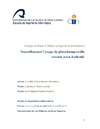Identificador persistente para citar o vincular este elemento:
https://accedacris.ulpgc.es/jspui/handle/10553/12691
| Campo DC | Valor | idioma |
|---|---|---|
| dc.contributor.advisor | Santos Espino, José Miguel | es |
| dc.contributor.advisor | Guerra Artal, Cayetano | es |
| dc.contributor.author | Ramos Martínez, Cynthia Paola | es |
| dc.contributor.other | Escuela de Ingeniería Informática | en_US |
| dc.date.accessioned | 2015-01-20T03:30:59Z | - |
| dc.date.accessioned | 2018-06-05T08:17:00Z | - |
| dc.date.available | 2015-01-20T03:30:59Z | - |
| dc.date.available | 2018-06-05T08:17:00Z | - |
| dc.date.issued | 2014 | en_US |
| dc.identifier.uri | https://accedacris.ulpgc.es/handle/10553/12691 | - |
| dc.description.abstract | El primordial objetivo del presente Trabajo de Final de Título (TFT) es realizar un juego de plataforma estilo runner para dispositivos móviles con sistema Android, y por medio de este, realizar un análisis de las diferentes herramientas que se pueden emplear para el desarrollo juegos para móvil estilo runner. El resultado que se obtuvo fue SweetRuner, una aplicación móvil que permite jugar en dispositivos móviles que posean sistema Android en una versión igual o superior a Honeycomb. Las características que posee SweetRunner son: creación aleatoria de los elementos del juego; obstáculos y bonificaciones; aumento de dificultad conforme aumenta la puntuación; cálculo de puntuación y puntuación máxima; finalmente, comunicación con la red social Facebook. El desarrollo de SweetRunner se realizó en el motor de videojuegos Unity3D, ya que es considerado la mejor opción para este tipo de juegos, por las facilidades que brinda y por su sencillez y amigabilidad. La mayoría de las herramientas empleadas en el desarrollo de la app son de software libre, pero también se ha trabajado con software privativo. Es por esta razón que el presente trabajo se distribuye bajo la licencia GNU LGPL versión3, ya que con esta licencia se pueden enlazar a un programa no GPL, que puede ser software libre o no. El presente trabajo tiene el potencial necesario para convertirse en una guía para desarrollar juegos para móviles estilo runner. Esta guía facilitará el proceso de desarrollo y optimización, además de ayudar a entender el funcionamiento y la potencialidad de las diferentes herramientas y componentes que se usaron. | en_US |
| dc.description.abstract | The primary objective of this Final Working Title (TFT) is making a runner style platform game for mobile devices with Android system, and through this, an analysis of the different tools that can be used for developing games mobile, runner style. The result obtained was SweetRuner, a mobile application that is optimized for play on mobile devices that have a version equal to or greater than Honeycomb Android system. SweetRunner possessing characteristics are: random creation of game elements; obstacles and bonuses; Difficulty increases with increasing score; calculation of score and maximum score; finally, communication with the social network Facebook. The development of SweetRunner was performed in professional Unity3D game engine, as it is considered the best choice for this type of game, for the facilities provided, for its simplicity and friendliness. Most of the tools used in the development of the app is free software, but has also worked with proprietary software. It is for this reason that the present work is distributed under the GNU LGPL Version3, because with this license can be linked to a non- GPL program, which can be free or not software. The present work has the potential to become a guide for developing mobile games runner style. This guide will facilitate the process of development and optimization, and help to understand the functioning and potential of the different tools and components that are used. | en_US |
| dc.format | application/pdf | es |
| dc.language | spa | en_US |
| dc.rights | by-nc-nd | es |
| dc.subject | 120317 Informática | en_US |
| dc.subject.other | Juego | es |
| dc.subject.other | Plataforma | es |
| dc.subject.other | Runner | es |
| dc.subject.other | SweetRunner | es |
| dc.subject.other | Honeycomb | es |
| dc.subject.other | GNU | es |
| dc.subject.other | LGPL | es |
| dc.title | SweetRunner : juego de plataforma estilo runner para Android | es |
| dc.type | info:eu-repo/semantics/bachelorThesis | en_US |
| dc.type | BachelorThesis | en_US |
| dc.compliance.driver | 1 | es |
| dc.contributor.departamento | Departamento de Informática Y Sistemas | es |
| dc.identifier.absysnet | 705461 | es |
| dc.investigacion | Ingeniería y Arquitectura | en_US |
| dc.rights.accessrights | info:eu-repo/semantics/openAccess | es |
| dc.type2 | Trabajo final de grado | en_US |
| dc.utils.revision | Sí | en_US |
| dc.identifier.matricula | TFT-33588 | es |
| dc.identifier.ulpgc | Sí | en_US |
| dc.contributor.titulacion | Grado en Ingeniería Informática | es |
| item.grantfulltext | open | - |
| item.fulltext | Con texto completo | - |
| crisitem.advisor.dept | GIR SIANI: Inteligencia Artificial, Redes Neuronales, Aprendizaje Automático e Ingeniería de Datos | - |
| crisitem.advisor.dept | IU de Sistemas Inteligentes y Aplicaciones Numéricas en Ingeniería | - |
| crisitem.advisor.dept | Departamento de Informática y Sistemas | - |
| crisitem.advisor.dept | GIR SIANI: Inteligencia Artificial, Redes Neuronales, Aprendizaje Automático e Ingeniería de Datos | - |
| crisitem.advisor.dept | IU de Sistemas Inteligentes y Aplicaciones Numéricas en Ingeniería | - |
| crisitem.advisor.dept | Departamento de Informática y Sistemas | - |
| Colección: | Trabajo final de grado | |
Visitas
254
actualizado el 15-ene-2026
Descargas
573
actualizado el 15-ene-2026
Google ScholarTM
Verifica
Comparte
Exporta metadatos
Los elementos en ULPGC accedaCRIS están protegidos por derechos de autor con todos los derechos reservados, a menos que se indique lo contrario.
